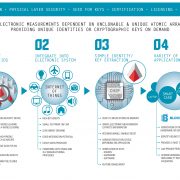EPUF – 100% Secure Electronic Solution
We live in digitised, connected societies, in an Internet of Things (IoT) world where our reliance on software, hardware, and the networks that connect us, grows exponentially. Our increasing global reliance on what we hope and assume are secure networks, is profound.
The threat of large-scale cyber-attack has become a strategic priority for all governments who continually rely on network solutions to ensure the running and security of their nations.
Yet, in 2017, regardless of the sheer size of addressable markets, the majority of public and private networks and systems underpinning global data security, IoT and E-commerce are using security protocols based on existing mathematical complexity. These protocols are vulnerable to intelligent attack; attacks which are increasing in success day by day.
Even existing PUF (Physically Unclonable Functions) based security solutions such as SRAM or Delay PUFs, which rely on classical properties, have been successfully cloned.
Quantum Base Solution: Quantum Q-IDs, our electronic quantum EPUF devices.
Our Q-IDs and EPUF inventions use unique arrangements of atoms and imperfections in these nano structures to create 100% unclonable devices, which are simple, small and cheap.
Simulation is not possible due to the inherent atomic randomness of quantum confinement.
Application of this in PUF architecture provides an ability to harbour secret identities on the nanoscale in devices that can be then incorporated in current microelectronic processes.
This unique quantum signature provides the basis for our identification and cryptography functionality. Our quantum EPUF devices have the highest bit density, the best integration potential, and use the least amount of resources.
They provide the ultimate in provable security, have low power usage, the smallest footprint possible, have low bandwidth requirements and all without the need for large scale computations, the accompanying infrastructure or processing requirements.
Gartner
“Through 2018, over 50% of Internet of Things (IoT) device manufacturers will not be able to address threats from weak authentication practices”
Accenture
“Attackers are getting smarter. Criminals are evolving new business models, such as ransomware-as-a-service, which mean that attackers are finding it easier to scale cyber crime globally.”
(2017 Cost of Cyber Crime Security)
Industry Information…

Please click here for the infographic

External Link to Full Report

Please click on the link to view the published article in Nature





